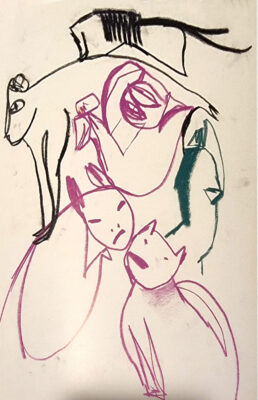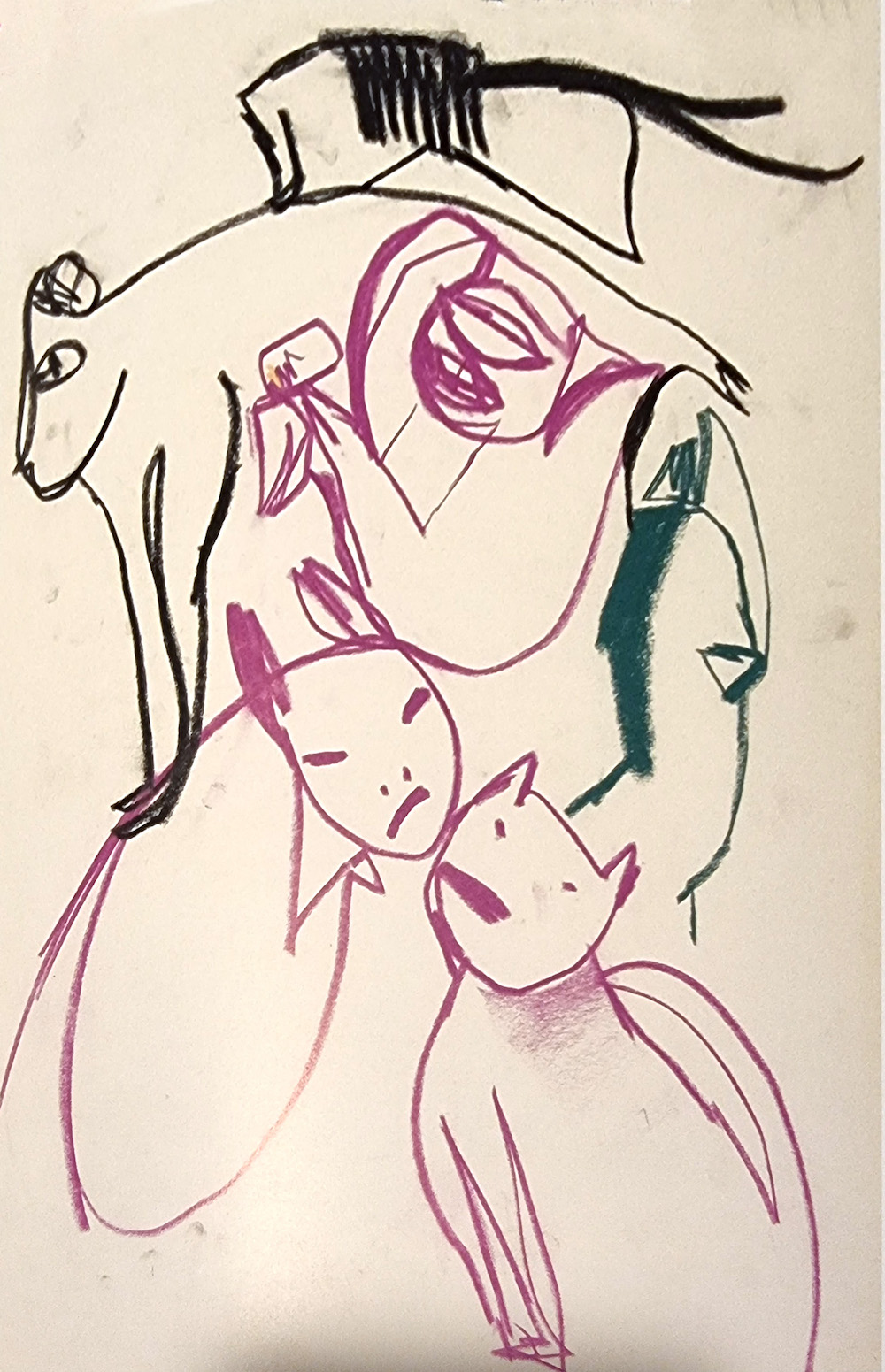Search
To search for an exact match, type the word or phrase you want in quotation marks.
A*DESK has been offering since 2002 contents about criticism and contemporary art. A*DESK has become consolidated thanks to all those who have believed in the project, all those who have followed us, debating, participating and collaborating. Many people have collaborated with A*DESK, and continue to do so. Their efforts, knowledge and belief in the project are what make it grow internationally. At A*DESK we have also generated work for over one hundred professionals in culture, from small collaborations with reviews and classes, to more prolonged and intense collaborations.
At A*DESK we believe in the need for free and universal access to culture and knowledge. We want to carry on being independent, remaining open to more ideas and opinions. If you believe in A*DESK, we need your backing to be able to continue. You can now participate in the project by supporting it. You can choose how much you want to contribute to the project.
You can decide how much you want to bring to the project.

What is possible with a model in which love and relations are not considered scarce objects to be hoarded and protected, but which proliferate beyond the confines of the socially constituted couple and nuclear family?
This is one of the many questions that Professor Kim TallBear attempts to answer in the essay Making Love and Relations Beyond Settler Sex and Family. Her point is that, everyone knows the script for sex, but not how to break free from the settler ways of it. Everyone knows how to make babies, but the making of kin—non-blood connections—is erased wisdom. Everyone belongs to a family, but few see family as a tool of emancipation from enduring colonial-capitalist relations. Everyone knows how important decolonization is as a project of disaggregation of the nuclear family by revealing how love, affection, and natality have been congealed at the service of settler colonialism. But decoloniality, she argues, is not an individual choice, nor an individual action, but a web of relations that critically unmake colonial society in a continuation between past, present, and future.
Kim TallBear, a citizen of the Sisseton-Wahpeton Oyate in present-day South Dakota, with eligibility for citizenship in the Cheyenne and Arapaho Tribes through her maternal grandfather, was raised on the Flandreau Santee Sioux Tribe reservation and in St. Paul, Minnesota, and brought up by her mother, grandmother, and great-grandmother, alongside many of her female relatives. Drawing from her community’s experiences of dispossession and the erosion of their values, TallBear’s essay reveals how the nuclear family functions as a tool for legitimizing and affirming the supremacy of the colonial system in America. By “making settler population” the nuclear family supported the US’s nation-building by substituting indigenous populations and their relational constellations. The nuclear family, secured as the smallest social unit of the Nation-State and enforced by Christianity, would represent middle-class spaces of safety where middle-class values and economics could thrive while parasitizing the land and the pre-existing Indigenous communities. As part of efforts to assimilate Indigenous peoples into the national body, both the church and the state evangelized marriage, nuclear family, and monogamy. These standards were imposed on Indigenous peoples as an aspirational model and used to justify curtailing their societies.
TallBear looks into these historical gaps rigorously, stating how these unearthed erased relational culture of Indigenous communities, specifically her own Dakota’s ancestors, where extended kin groups, including plural marriages and mutual support beyond blood and family relations, created wholesome social textures. It is no surprise that the abundance of consensual non-monogamous relationships assures the well-being of the community beyond the Western-centric nation-based society. TallBear recounts these as she tells about how she grew up in a very pro-kinship and non-natalist community, where natality and kinship didn’t involve reproducing the middle-class settler family structure. Her experience teaches us how to criticize the hierarchies of the nuclear family, beyond the sexuality and the gender of the people involved, as this unit stands for a project of governability, of a yet, self-governing and abundance-loving web of relations. She argues and invites the reader to think about how to disentangle procreation from the reproduction of the heteronormative- patriarchal colonial social status quo.
In the essay, published as part of Donna Haraway’s Making Kin Not Population collection of perspectives on the matter, TallBear grieves the extended kinship social model, acknowledging that it has been substituted by definitions that objectify relationships and genders di per se. Even polyamory or queerness, the closest relational and gender model to the eradicated abundance of a pre-colonial world, are still settler sexuality models and fail to describe the multiple shapes of love, solidarity, respect, and rituals nurtured by Indigenous communities. TallBear encourages a collective opposition to the system of compulsory settler sexuality and family that continues substituting Indigenous kinships with making population. Ultimately, recognizing possibilities of other kinds of intimacies, not focused on biological reproduction and making population, but caretaking precious kin who come to our attention in diverse ways, is the first step to unsettling settler sex and family.
This is an invitation to look at sexuality through the lens of spirituality and nature, and how the intersubjectivity of relationships in these two realism is formed for mutual connectivity, shared responsibility, and independent well-being. An invitation to resist the objectification of intersubjective forces and to broaden our attention to non-human relationships too, which live beyond settler capitalism. A de-objectified reconstituting of relations, and nurturing, healing exchanges of power while rehearsing purposeful and open nonmonogamy and reconceiving of more just intimacies with other-than humans seem like important next steps. Readers who embrace this invitation of disordering and disaggregating, and ultimately, recognizing possibilities of other notions of intimacies, shall focus on joy and not biological reproduction, caretaking precious kin.
TallBear adds a decolonial piece to the broad puzzle of literature on the matter such as All about Love: New Visions by bell hooks or Full Surrogacy Now: Feminism Against Family by Sophie Lewis or the renewed Polysecure by Jessica Fern to reference some, that advocates for the abolition of the supremacy of heteronormative families. Inviting to think beyond the instrumentalization of families to give security amidst the constant crisis of capitalism, to control and prescribe the way life comes to happen through pregnancy. While writing this review in Italy, the container I come from, reproduction technologies that challenge “natural pregnancy”, like surrogate motherhood, are legally and universally forbidden, and pro-life functionaries are allowed in gynecological clinics to discourage women from having abortions, regimenting reproduction on a legislative level. Worldwide governments, squeezing labor forces from women’s wombs, have more agency on women’s bodies than women themselves. For those familiar with the process of breaking down and reimagining relational forms—whether through relationship anarchy or polyamory—we understand that building a rich, nonhierarchical network of connections comes up against a persistent scarcity in capitalist metropolitan life: time. This desire, and to the surprise of many who are not yet engaged in processes of unmaking relations, is strongly intertwined with anti-capitalism. It can organically happen, that we are freed from labor time to nurture the relationship before its codification, to free our relationships from codification, to turn, together, ungovernable.

Leiko Ikemura, Ohne Titel, 1984. Courtesy of Leiko Ikemura
(Cover image: Leiko Ikemura, Trees out of Head, 2015-2020. Courtesy of Leiko Ikemura)

Dalia Maini aka DM aka Dalia Maini Troise aka DMT, is a slow thinker and cultural agitator, who writes and edits for and within the undercommons. Dalia Maini is editor in chief of Arts of the Working Class.
"A desk is a dangerous place from which to watch the world" (John Le Carré)